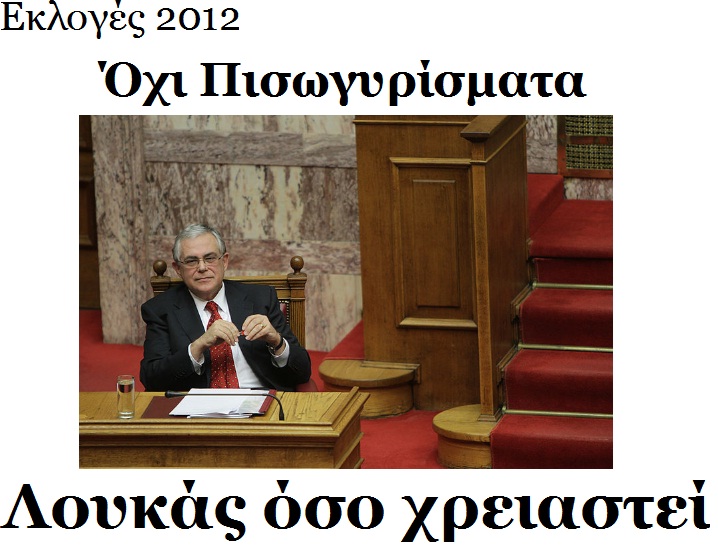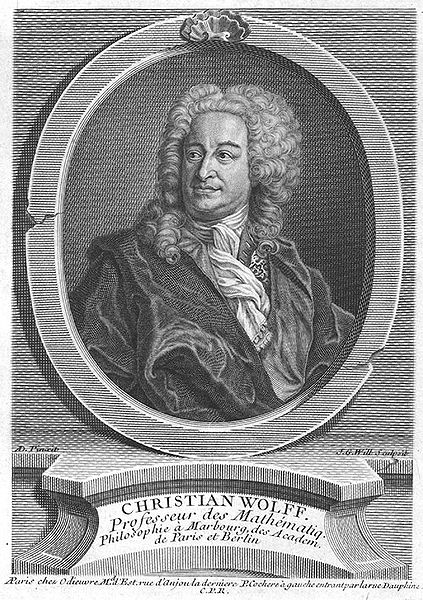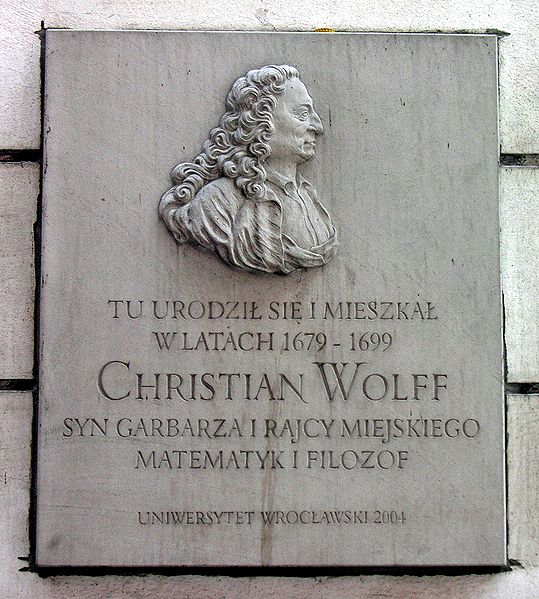<Back to Index>
- Philosopher Christian Wolff, 1679
- Architect John Vanbrugh, 1664
- King of Prussia Friedrich II, 1712
PAGE SPONSOR



Christian Wolff (less correctly Wolf; also known as Wolfius; ennobled as: Christian Freiherr von Wolff; 24 January 1679 - 9 April 1754) was a German philosopher.
He was the most eminent German philosopher between Leibniz and Kant. His main achievement was a complete oeuvre on
almost every scholarly subject of his time, displayed and unfolded
according to his demonstrative - deductive, mathematical method, which
perhaps represents the peak of Enlightenment rationality in Germany. Wolff was also the creator of German as the language of scholarly instruction and research, although he also wrote in Latin, so that an international audience could, and did, read him. A founding father of, among other fields, economics and public administration as academic disciplines, he concentrated especially in these fields, giving advice on practical matters to people in government, and stressing the professional nature of university education.
Wolff was born in Breslau, Silesia, into a modest family. He studied mathematics and physics at the University of Jena, soon adding philosophy. In 1703, he qualified as Privatdozent at the University of Leipzig, where he lectured until 1706, when he was called as professor of mathematics and natural philosophy to the University of Halle. By this time he had made the acquaintance of Leibniz, of whose philosophy his own system is a modified version. At Halle, Wolff at first restricted himself to mathematics, but on the departure of a colleague, he added physics, and soon included all the main philosophical disciplines.
However, the claims Wolff advanced on behalf of philosophical reason appeared impious to his theological colleagues. Halle was the headquarters of Pietism, which, after a long struggle against Lutheran dogmatism, had itself assumed the characteristics of a new orthodoxy. Wolff's professed ideal was to base theological truths on mathematically certain evidence. Strife with the Pietists broke out openly in 1721, when Wolff, on the occasion of stepping down as pro-rector, delivered an oration "On the Practical Philosophy of the Chinese", in which he praised the purity of the moral precepts of Confucius, pointing to them as an evidence of the power of human reason to reach moral truth by its own efforts.
As a consequence, Wolff was ousted in 1723 from his first chair at Halle in one of the most celebrated academic dramas of the 18th century. His enemies had gained the ear of the king Frederick William I and told him that, if Wolff's determinism were recognized, no soldier who deserted could be punished, since he would only have acted as it was necessarily predetermined that he should. This so enraged the king that he immediately deprived Wolff of his office, and commanded him to leave Prussian territory within 48 hours or be hanged. The same day Wolff passed into Saxony, and presently proceeded to Marburg in Hesse - Kassel (or Hesse-Cassel), to whose university he had received a call even before this crisis, which was now renewed. The Landgrave of Hesse received him with every mark of distinction, and the circumstances of his expulsion drew universal attention to his philosophy. It was everywhere discussed, and over two hundred books and pamphlets appeared for or against it before 1737, not reckoning the systematic treatises of Wolff and his followers.
At the University of Marburg, as one of the most popular and fashionable university teachers in Europe, he increased matriculation figures within five years by about 50%. In 1740 Frederick William died, and one of the first acts of his son and successor, Frederick the Great, an admirer of Wolff, was to recall him to Halle. His entry into the town on 6 December 1740 took on the character of a triumphal procession. In 1743, he became chancellor of the university, and in 1745, he received the title of Freiherr (Baron) from the Elector of Bavaria. But his matter was no longer fashionable, he had outlived his power of attracting students, and his classrooms remained, while not empty, then certainly emptier than they had been during his heyday in Marburg.
When Wolff died on 9 April 1754, he was a very wealthy man, almost entirely due to his income from lecture fees, salaries, and royalties. He was also a member of many academies and probably the first scholar to have been created hereditary Baron of the Holy Roman Empire on the basis of his academic work. His school, the Wolffians, was the first school, in the philosophical sense, associated with a German philosopher. It dominated Germany until the rise of Kantianism.
The mountain Mons Wolff on the Moon got its name in his honour.
The Wolffian philosophy held almost undisputed sway in Germany until it was displaced by the Kantian revolution, due partly to his distinctive habit of writing in both Latin and German. Wolff's philosophy has, until a reevaluation set in the 1960s, often been held to be a common sense adaptation or watering down of the Leibnizian system; or, more charitably, Wolff was said to have methodized and "reduced" to dogmatic form the thoughts of his great predecessor.
These are mainly his comprehensive view of philosophy, as embracing in its survey the whole field of human knowledge, his insistence everywhere on clear and methodic exposition, and his confidence in the power of reason to reduce all subjects to this form. The Wolffian system retains the determinism and optimism of Leibniz, but the monadology recedes into the background, the monads falling asunder into souls or conscious beings on the one hand and mere atoms on the other. The doctrine of the pre-established harmony also loses its metaphysical significance - while remaining an important heuristic device - and the principle of sufficient reason introduced by Leibniz is once more discarded in favor of the principle of contradiction which Wolff seeks to make the fundamental principle of philosophy.
Philosophy is defined by him as the science of the possible, and divided, according to the two faculties of the human individual, into a theoretical and a practical part. Logic, sometimes called philosophia rationalis, forms the introduction or propaedeutics to both. Theoretical philosophy has for its parts ontology or philosophia prima, cosmology, rational psychology and natural theology; ontology treats of the existent in general, psychology of the soul as a simple non-extended substance, cosmology of the world as a whole, and rational theology of the existence and attributes of God. These are best known to philosophical students by Kant's treatment of them in the Critique of Pure Reason. Practical philosophy is subdivided into ethics, economics and politics. Wolff's moral principle is the realization of human perfection - seen realistically as the kind of perfection the human person actually can achieve in the world in which we live. It is perhaps the combination of Enlightenment optimism and worldly realism that made Wolff so successful and popular as a teacher of future states and business leaders.